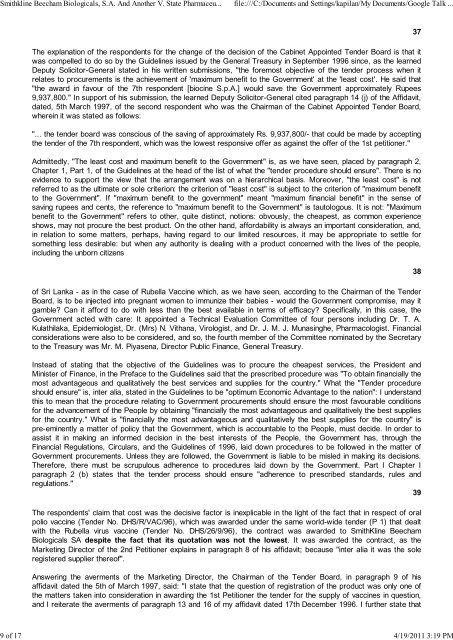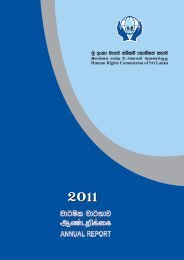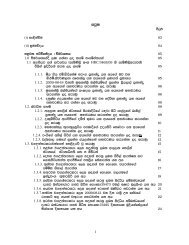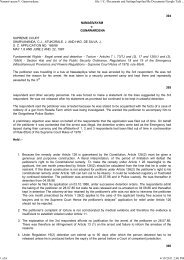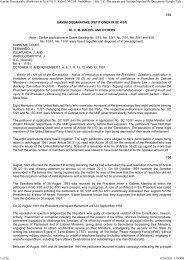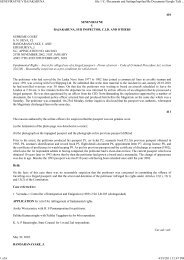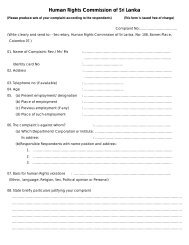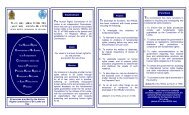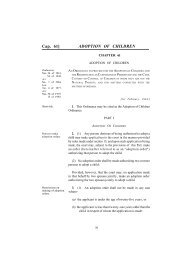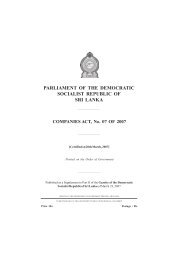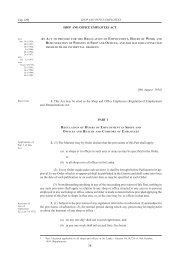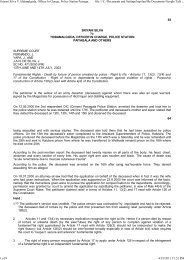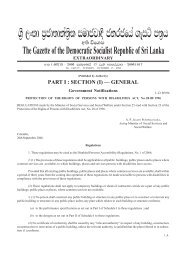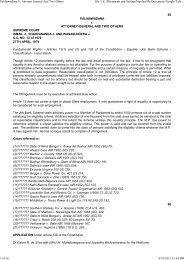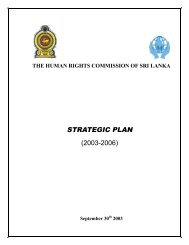Smithkline Beecham Biologic... - Human Rights Commission of Sri ...
Smithkline Beecham Biologic... - Human Rights Commission of Sri ...
Smithkline Beecham Biologic... - Human Rights Commission of Sri ...
Create successful ePaper yourself
Turn your PDF publications into a flip-book with our unique Google optimized e-Paper software.
<strong>Smithkline</strong> <strong>Beecham</strong> <strong>Biologic</strong>als, S.A. And Another V. State Pharmaceu... file:///C:/Documents and Settings/kapilan/My Documents/Google Talk ...<br />
The explanation <strong>of</strong> the respondents for the change <strong>of</strong> the decision <strong>of</strong> the Cabinet Appointed Tender Board is that it<br />
was compelled to do so by the Guidelines issued by the General Treasury in September 1996 since, as the learned<br />
Deputy Solicitor-General stated in his written submissions, "the foremost objective <strong>of</strong> the tender process when it<br />
relates to procurements is the achievement <strong>of</strong> 'maximum benefit to the Government' at the 'least cost'. He said that<br />
"the award in favour <strong>of</strong> the 7th respondent [biocine S.p.A.] would save the Government approximately Rupees<br />
9,937,800." In support <strong>of</strong> his submission, the learned Deputy Solicitor-General cited paragraph 14 (j) <strong>of</strong> the Affidavit,<br />
dated, 5th March 1997, <strong>of</strong> the second respondent who was the Chairman <strong>of</strong> the Cabinet Appointed Tender Board,<br />
wherein it was stated as follows:<br />
"... the tender board was conscious <strong>of</strong> the saving <strong>of</strong> approximately Rs. 9,937,800/- that could be made by accepting<br />
the tender <strong>of</strong> the 7th respondent, which was the lowest responsive <strong>of</strong>fer as against the <strong>of</strong>fer <strong>of</strong> the 1st petitioner."<br />
Admittedly, "The least cost and maximum benefit to the Government" is, as we have seen, placed by paragraph 2,<br />
Chapter 1, Part 1, <strong>of</strong> the Guidelines at the head <strong>of</strong> the list <strong>of</strong> what the "tender procedure should ensure". There is no<br />
evidence to support the view that the arrangement was on a hierarchical basis. Moreover, "the least cost" is not<br />
referred to as the ultimate or sole criterion: the criterion <strong>of</strong> "least cost" is subject to the criterion <strong>of</strong> "maximum benefit<br />
to the Government". If "maximum benefit to the government" meant "maximum financial benefit" in the sense <strong>of</strong><br />
saving rupees and cents, the reference to "maximum benefit to the Government" is tautologous. It is not: "Maximum<br />
benefit to the Government" refers to other, quite distinct, notions: obvously, the cheapest, as common experience<br />
shows, may not procure the best product. On the other hand, affordability is always an important consideration, and,<br />
in relation to some matters, perhaps, having regard to our limited resources, it may be appropriate to settle for<br />
something less desirable: but when any authority is dealing with a product concerned with the lives <strong>of</strong> the people,<br />
including the unborn citizens<br />
<strong>of</strong> <strong>Sri</strong> Lanka - as in the case <strong>of</strong> Rubella Vaccine which, as we have seen, according to the Chairman <strong>of</strong> the Tender<br />
Board, is to be injected into pregnant women to immunize their babies - would the Government compromise, may it<br />
gamble? Can it afford to do with less than the best available in terms <strong>of</strong> efficacy? Specifically, in this case, the<br />
Government acted with care: It appointed a Technical Evaluation Committee <strong>of</strong> four persons including Dr. T. A.<br />
Kulathilaka, Epidemiologist, Dr. (Mrs) N. Vithana, Virologist, and Dr. J. M. J. Munasinghe, Pharmacologist. Financial<br />
considerations were also to be considered, and so, the fourth member <strong>of</strong> the Committee nominated by the Secretary<br />
to the Treasury was Mr. M. Piyasena, Director Public Finance, General Treasury.<br />
Instead <strong>of</strong> stating that the objective <strong>of</strong> the Guidelines was to procure the cheapest services, the President and<br />
Minister <strong>of</strong> Finance, in the Preface to the Guidelines said that the prescribed procedure was "To obtain financially the<br />
most advantageous and qualitatively the best services and supplies for the country." What the "Tender procedure<br />
should ensure" is, inter alia, stated in the Guidelines to be "optimum Economic Advantage to the nation": I understand<br />
this to mean that the procedure relating to Government procurements should ensure the most favourable conditions<br />
for the advancement <strong>of</strong> the People by obtaining "financially the most advantageous and qualitatively the best supplies<br />
for the country." What is "financially the most advantageous and qualitatively the best supplies for the country" is<br />
pre-eminently a matter <strong>of</strong> policy that the Government, which is accountable to the People, must decide. In order to<br />
assist it in making an informed decision in the best interests <strong>of</strong> the People, the Government has, through the<br />
Financial Regulations, Circulars, and the Guidelines <strong>of</strong> 1996, laid down procedures to be followed in the matter <strong>of</strong><br />
Government procurements. Unless they are followed, the Government is liable to be misled in making its decisions.<br />
Therefore, there must be scrupulous adherence to procedures laid down by the Government. Part I Chapter I<br />
paragraph 2 (b) states that the tender process should ensure "adherence to prescribed standards, rules and<br />
regulations."<br />
39<br />
The respondents' claim that cost was the decisive factor is inexplicable in the light <strong>of</strong> the fact that in respect <strong>of</strong> oral<br />
polio vaccine (Tender No. DHS/R/VAC/96), which was awarded under the same world-wide tender (P 1) that dealt<br />
with the Rubella virus vaccine (Tender No. DHS/26/9/96), the contract was awarded to SmithKline <strong>Beecham</strong><br />
<strong>Biologic</strong>als SA despite the fact that its quotation was not the lowest. It was awarded the contract, as the<br />
Marketing Director <strong>of</strong> the 2nd Petitioner explains in paragraph 8 <strong>of</strong> his affidavit; because "inter alia it was the sole<br />
registered supplier there<strong>of</strong>".<br />
Answering the averments <strong>of</strong> the Marketing Director, the Chairman <strong>of</strong> the Tender Board, in paragraph 9 <strong>of</strong> his<br />
affidavit dated the 5th <strong>of</strong> March 1997, said: "I state that the question <strong>of</strong> registration <strong>of</strong> the product was only one <strong>of</strong><br />
the matters taken into consideration in awarding the 1st Petitioner the tender for the supply <strong>of</strong> vaccines in question,<br />
and I reiterate the averments <strong>of</strong> paragraph 13 and 16 <strong>of</strong> my affidavit dated 17th December 1996. I further state that<br />
9 <strong>of</strong> 17 4/19/2011 3:19 PM<br />
37<br />
38


